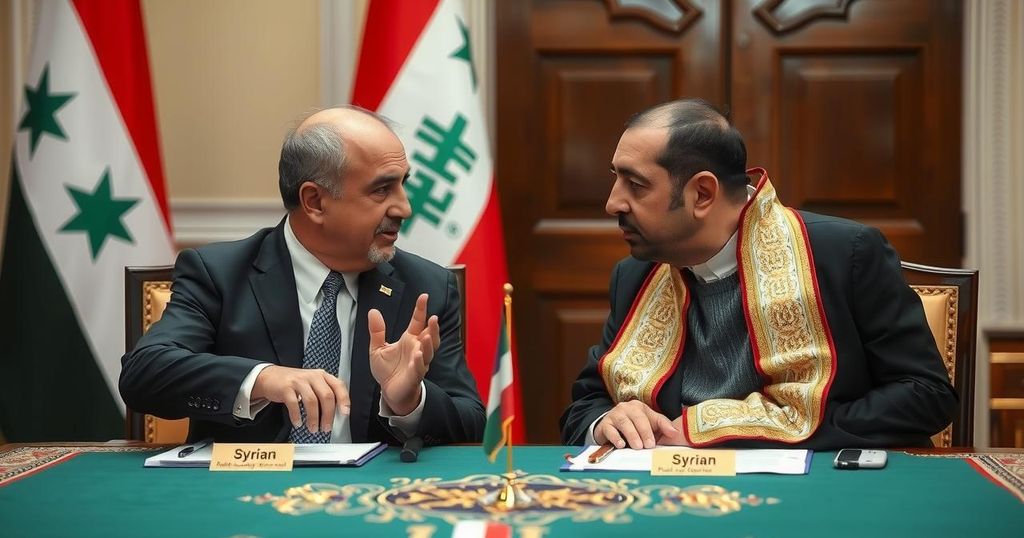Jordan’s Commitment to Supporting Syria’s Reconstruction Following Political Transition
Jordan’s Foreign Minister Ayman Safadi met with Syria’s new leader Ahmed al-Sharaa to express Jordan’s support for the reconstruction of Syria after the recent political changes. The discussions highlight regional cooperation aimed at stability, security, and humanitarian support for the Syrian people amidst a shifting geopolitical landscape.
Jordan’s Foreign Minister, Ayman Safadi, has reaffirmed the kingdom’s commitment to supporting Syria’s reconstruction, as he meets with Ahmed al-Sharaa, the newly recognized leader in Damascus. Safadi emphasized, “We stand by our Syrian brothers as they start the rebuilding process,” highlighting Jordan’s readiness to assist in renewing stability and security in the region following the recent upheaval that led to the ousting of President Bashar al-Assad.
During this visit, Safadi conveyed Jordan’s objectives for a stable and secure Syria that respects the rights of its citizens, suggesting a transitional process that aligns with the aspirations of the Syrian people.
Accompanying regional dynamics, officials from Qatar also engaged with Syrian leaders, marking a reinvigoration of diplomatic relations after years of strained ties. Qatar’s Foreign Ministry spokesperson stated that discussions would reinforce Qatar’s commitment to the Syrian populace.
Moreover, Turkey’s foreign minister, Hakan Fidan, had pledged assistance to smooth the political transition and rebuild the war-afflicted country. Both Fidan and al-Sharaa stressed the importance of unity and called for lifting international sanctions imposed on Syria.
The Leon of stability in Syria greatly concerns Jordan, which shares a lengthy border. “We want that border to be stable, free from terrorist organizations, free from drugs and weapon smuggling,” Safadi stated, recognizing the significance of regional security in combating drug trafficking issues, particularly with the rise in demand for Captagon. This growing concern led Jordan to tighten border controls in recent times.
In a broader context, the recent diplomatic activities signal a shift in regional attitudes towards Syria, especially as al-Sharaa aims to strengthen ties with neighboring countries. As he pursues formal recognition, al-Sharaa has received multiple delegations from Arab and international representatives, indicating a complex landscape following the change in leadership in Syria.
Additionally, Iran reaffirmed its support for Syria’s sovereignty amidst the evolving situation, advocating for a future where the Syrian people can chart their own course devoid of foreign intervention. Thus, it appears there is a consensus among regional actors regarding the necessity for peace and stability in Syria following the protracted conflict which has destabilized the region.
The recent shift in Syria’s political leadership marks a significant turning point for regional relations. The overthrow of President Bashar al-Assad has prompted neighboring countries, including Jordan and Qatar, to reestablish diplomatic ties and engage in discussions aimed at Syria’s reconstruction. This renewed focus on stability is underscored by Jordan’s strategic interests, given its shared border with Syria and the influx of Syrian refugees. The international community’s stance also appears to be shifting, with actors like Turkey and the United States expressing support for a transitional process that honors the wishes of the Syrian populace. The diplomatic landscape remains dynamic as various nations navigate their respective interests in this new chapter of Syrian politics.
In conclusion, the recent diplomatic engagements between Jordan, Qatar, Turkey, and the new Syrian administration underscore a collective effort to facilitate Syria’s transition towards stability and reconstruction. Jordan, through its Foreign Minister’s remarks, emphasizes its dedication to supporting the Syrian people amidst ongoing regional discussions. The diplomatic tides appear to be turning towards recognition and cooperation, marking a new chapter in Syria’s relations with its neighbors following the recent political upheaval.
Original Source: www.aljazeera.com




Post Comment